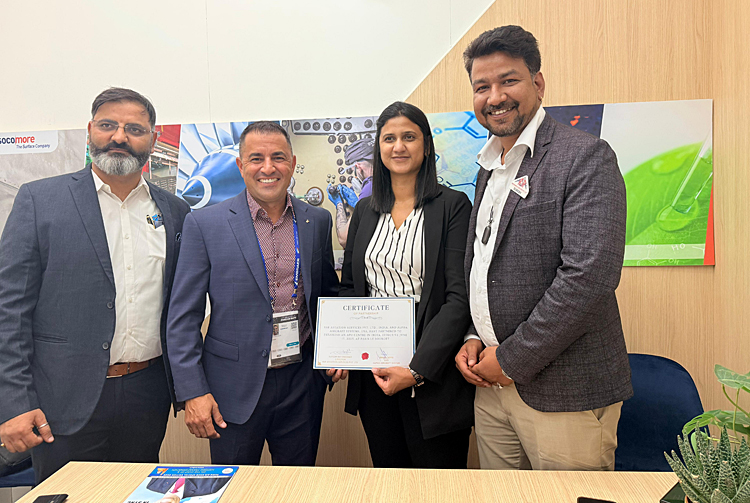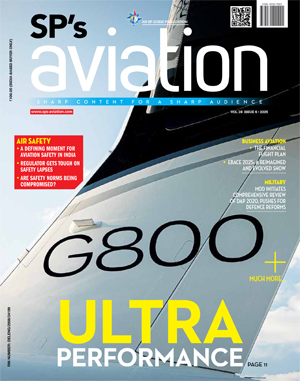INDIAN ARMED FORCES CHIEFS ON OUR RELENTLESS AND FOCUSED PUBLISHING EFFORTS

The insightful articles, inspiring narrations and analytical perspectives presented by the Editorial Team, establish an alluring connect with the reader. My compliments and best wishes to SP Guide Publications.

"Over the past 60 years, the growth of SP Guide Publications has mirrored the rising stature of Indian Navy. Its well-researched and informative magazines on Defence and Aerospace sector have served to shape an educated opinion of our military personnel, policy makers and the public alike. I wish SP's Publication team continued success, fair winds and following seas in all future endeavour!"

Since, its inception in 1964, SP Guide Publications has consistently demonstrated commitment to high-quality journalism in the aerospace and defence sectors, earning a well-deserved reputation as Asia's largest media house in this domain. I wish SP Guide Publications continued success in its pursuit of excellence.
- Prime Minister Modi Visits Punjab’s Adampur Air Base, Interacts with Airmen after Successful ‘Operation Sindoor’; Stern Message to Pakistan
- The layered Air Defence systems that worked superbly, the key element of Operation Sindoor
- Operation Sindoor | Day 2 DGMOs Briefing
- Operation Sindoor: Resolute yet Restrained
- India's Operation Sindoor Sends a Clear Message to Terror and the World – ‘ZERO TOLERANCE’
- Japan and India set forth a defence cooperation consultancy framework, talks on tank and jet engines
RSR Aviation (India) and Alpha Aircraft Systems (USA) Sign Strategic Agreement at Paris Airshow to Establish APU MRO Facility in India

In a landmark event at the ongoing Salon Du Bourget – Paris Air Show, RSR Aviation Services Pvt Ltd of India and Alpha Aircraft Systems of the USA today, June 17, have entered into an agreement to get into the MRO sector by opening an Auxiliary Power Unit (APU) facility in India by the second quarter of 2026 under the Atama Nirbhar Bharat – Make in India programme of Indian Prime Minister Narendra Modi.
Under the agreement signed today, RSR Aviation and Alpha Aircraft Systems will jointly set up an APU overhaul and testing centre in India, preferably in a designated aerospace industrial cluster in India.
“It is indeed an honour to sign the agreement at the Paris Air Show. Alpha Aircraft System is a pioneer in APU MRO based in the USA and has agreed to handhold our company for setting up of an APU MRO Centre in India under the vision of our Prime Minister Make-in-India. RSR staff would be trained by Alpha Aircraft in the USA, along with transfer of technology to build the APU centre in India,” said Suresh Rahangdale, Director of RSR Aviation Services.
“We always wanted to have a strong base in India. Our agreement with RSR Aviation will help in achieving our goal. I am sure this would be an important milestone for us. Cheers to the team who made it happen”, said Israel Leppe, Chief Executive Officer, Alpha Aircraft System. This joint venture between RSR Aviation and Alpha Aircraft Systems will bring the following benefits to the Indian MRO eco-system:
Strategic Self-Reliance:
Today, a significant portion of India's APU repair and overhaul needs are met through expensive and time-consuming overseas shipping and repairs. By setting up this local APU MRO centre, RSR Aviation and Alpha Aircraft Systems will help India reduce its dependency on foreign MRO stations, ensuring faster turnaround times and greater fleet availability for both civil and defence operators.
High-Skill Employment & Knowledge Transfer:
Under the partnership, Alpha Aircraft Systems will impart extensive hands-on training to Indian engineers and technicians at its state-of-the-art facility in Miami, USA, and through onsite programs in India. This will cultivate a skilled workforce proficient in the latest APU overhaul technologies and global best practices, creating sustainable high-value jobs in the country's aerospace sector.
Cost Efficiency and Foreign Exchange Savings:
By bringing APU overhaul capabilities to India, airlines and defence operators can significantly cut costs related to logistics, downtime, and foreign repair bills — contributing to substantial annual savings in foreign exchange and operational budgets.
Boost to Indigenous Ecosystem:
The project will foster the growth of India's aerospace supply chain by generating demand for local spares suppliers, tooling, calibration services, logistics partners, and other ancillary industries. It aligns with India's vision of developing a self-sufficient aerospace and defence industrial base.
Global Standards and Certification:
The facility will adhere to stringent FAA/EASA-approved procedures and quality benchmarks, ensuring that Indian operators receive MRO services matching the highest international standards without the need to send components abroad.
Support to Defence Preparedness:
Reliable and rapid APU MRO services are vital for military aircraft readiness. The new facility will strengthen India's defence aviation maintenance ecosystem by providing secure, in-country support for mission-critical systems.





